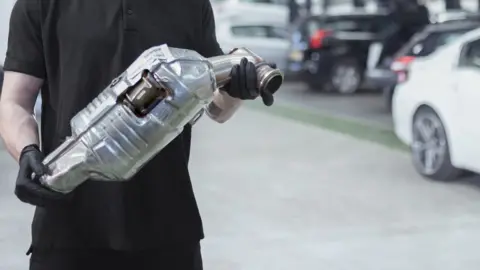Catalytic converters: Demand for precious metals drives surge in thefts
 Getty Images
Getty ImagesCatalytic converter thefts have surged in lockdown amid a spike in the value of precious metals, research shows.
The RAC and insurer Ageas found the crime now accounts for three-in-10 thefts from private vehicles in the UK, up from two-in-10 before the pandemic.
Catalytic converters contain metals such as platinum and rhodium which fetch high prices on the black market.
When values of these metals go up it usually leads to a spate of thefts, the RAC and Ageas said.
They pointed out that prices of rhodium hit record highs earlier this year, having climbed more than 200% since March 2020.
The research compared thefts during the first three months of the year, compared with the period between October and December 2019.
RAC spokesman Simon Williams said: "Drivers are often oblivious of their vehicle's catalytic converter being stolen. Our patrols are often called to attend cars that have suddenly become excessively noisy.
"On investigation it's very often the case that the car's catalytic converter has been stolen."
According to the research, most thefts happen while cars are parked at home, either on the driveway or the road.
But converters have occasionally been stolen in supermarket car parks while the driver is shopping, the research said.
Mr Williams recommended motorists take extra precautions, parking their vehicle in well-lit residential locations, or ideally a garage.
"When away from home, look for car parks that have security patrols and are covered by CCTV," he said.
Because thieves slide under the car to get at the catalytic converters, parking against a wall can also help.
Catalytic converters form part of a car's exhaust system. They contain a honeycomb coated with precious metals such as platinum, palladium and rhodium which help to reduce and filter harmful gases from the vehicles' exhaust systems.
While converters are just one component of a car, their theft can often result in a driver's car being written off.